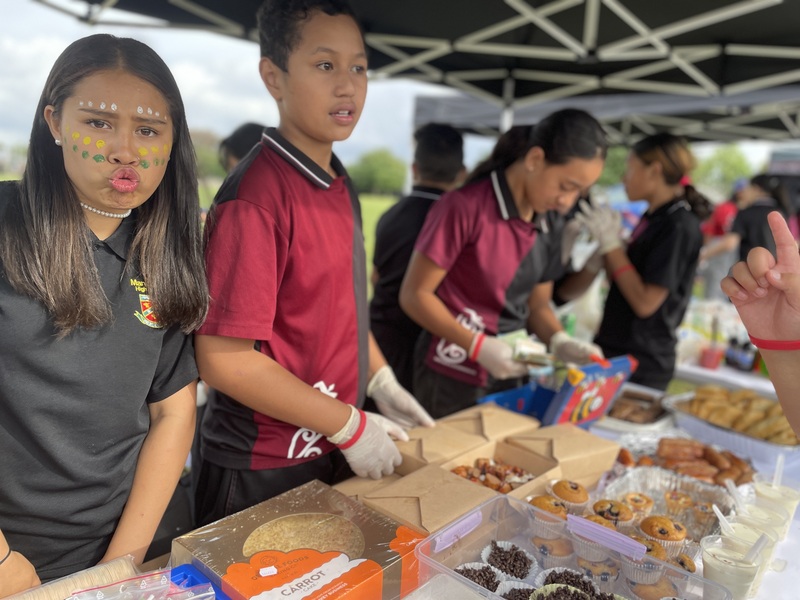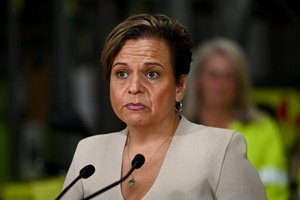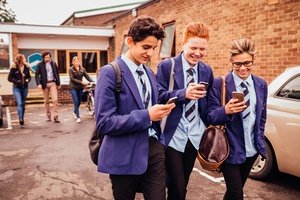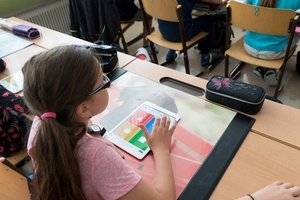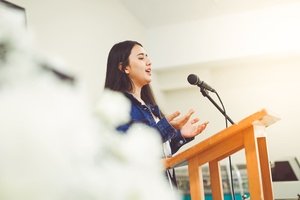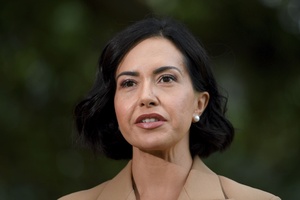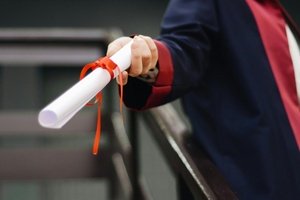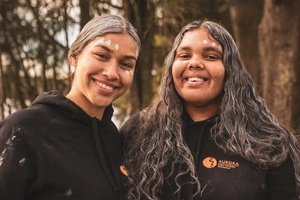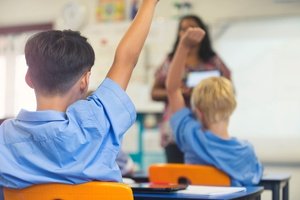The plan, which he has called “ambitious”, is comprised of 49 actions, including banning the use of cellphones in school and mandating an hour of reading, writing and maths per day. So how will these policies affect things at the coal face? In this two-part series we’ll profile a couple of influential New Zealand school leaders to see what the first 100 days of the school year might look like for them, and whether the Government’s plans will really have much of an impact. First-up, here’s what Ross Devereux, deputy principal at Auckland’s Manurewa Intermediate School, has to say.
So Ross, paint me a picture of your first 100 days of the school year, what do they look like?
The massive emphasis for us is establishing those relationships with our kids and then, of course, with their whānau, which is so very important.
Essentially, the first day of school, we call it ‘Whānau Funday’, starts with a pōwhiri in the morning, a Maori welcome, and from there, a lot of communication to our parents via our principal, Ian. We look at all the aspects of how the school year is going to run, what it's going to look like, but really make sure that they are informed and welcomed. That triangle between us, the parent and the child, that's our focus.
So day one, the parents are invited to stay at school, to stay with the kids in class, even in the middle block of learning. And then the day finishes with our famous school singing, which has parents included as well. The kids are in their different house groups which we call whanau groups and so the parents are seeing those connections.
Day one kind of encompasses the first 100 days, not to sound too ethereal…In week three, we go on our full school camp. Our four whānau groups, Rimu, Kauri, Kowhai and Tawa, and each of those whānau groups has roughly around 220 kids. So we’ve all been at school for only a week-and-a-half, and then our first camp is off, we go off to an island in the Hauraki Gulf called Motutapu Island.
For that camp to work, we need a lot of parental involvement, just to boost numbers. And part of it is not simply getting parent help, but actually partnering with the parents around what the rest of the year is going to look like. So the camp is essentially a vehicle to build those relationships with the home room teacher and their class, but then the second ripple around that being the parents, there’s an involvement there. Now obviously not every parent comes, that would be pretty tricky, but enough of them to form that bond.
One more thing that precedes that, which takes place on our fifth day of school, is our famous night market. So going back a step, we were saying, ‘all right kids, we’re going to essentially fund your camp as a school because we think it’s important that every child goes and no one gets left behind – so you guys are going to have to come up with, as a class, an entrepreneurial idea to sell to our community to raise money for food that you're going to eat at camp’. And so we call on our community, on our parents … to supply something that we can sell. It’s nearly always food, because especially our Pacific and Māori parents, love supplying food. Our night market starts at 4pm and finishes at 6.30pm, and to be honest, half the classes are sold out of their stuff within the first hour, because it’s just so well supported.
So all of these things work together to really just hit the ground running, within those first couple of weeks of school, they're all vehicles to illustrate the importance of that family and community connection for our kids.
How do you anticipate the change in government will affect you at the coal face?
Not too much. I mean the way in which we run things here, we’ve had the most recent Government visit us, where they have been really blown away by the systems and structures that we have here surrounding all levels of student achievement, pastoral, behavioural, belonging, that sort of thing.
So I think having that direct feedback makes us feel like we are doing the right thing, and I don’t suggest that’s a new idea. I think along the way and along the transformational change that we’ve been across in the last 15 years is that we feel really confident that we are doing the right thing, and that’s based on the accelerated progress that we see with our kids in the two years they are with us.
So look, I mean governments come and go, not to sound too blasé about it, but I think this Government’s bringing in some things which I think actually nationwide, dare I say it, could be quite good.

In September, prior to his election win, Luxon told a public meeting in east Auckland that the primary responsibility of teachers is to “teach the basics well” and the primary responsibility of parents should be to “do sex education in the home”.
The Government has asked all schools to have a student phone rule in place by Term 2, how are you working towards this?
Well, we’re not working towards it, because we’ve already got it. This is one of those things that [makes you think] perhaps common sense is not that common (laughs). As long as I’ve been at the school, since 2011, the system is … students arrive to school with their phones, no problem, they check it into the office, whereupon we put a rubber band around the phone with a little tag on it. The tag is the same colour as their whānau group, it gets put in a lockable container, it gets locked away in the back of the main office, that child keeps walking into the school grounds and off they go. At the end of the day, the system is reversed. They form a line, they find their phone, they go home.
So kids don’t have phones in our school, there’s no need for it. But we understand that some parents want to contact their child after school to get picked up, or before school to make sure they’ve got their safe, and naturally we have no problem with that, but once they walk into the office, it’s handed in.
The Government is also stipulating students up to Year 8 spend an average of an hour a day reading, writing and doing maths. Will this require much change at a school level?
Yeah, look, again, I don't think so. I think it’s really important that people don’t see that as black and white as it perhaps reads, in the sense that ‘child A’ is going to be sat down for an hour, right the bell goes, put your book away, next hour and now you’re doing writing. I think it’s realising that, that is threaded through just the implementation of the New Zealand Curriculum.
So the way that we structure our specialisation is that students are doing an hour of reading, an hour of writing, an hour of maths a day, throughout the various aspects … so, in science, if students spend 20 minutes on levels of conversions, of measuring, that’s maths. In music, if they’re adding up the beats in a bar, that’s still maths, so it’s actually being able to look at it in a cross-curricular way. And reading and writing will happen in science, it will happen in performing arts, it will happen in digital technologies, just in a different way.
The Coalition Government are planning changes to sex education, including the removal and replacement of the gender, sexuality, and relationship-based education guidelines. Do you have any concerns about what the current curriculum might be replaced with?
Nothing has come across our desk yet that throws up a concern … We’re very responsive to the community on the needs of our kids and we will aim to meet those needs for whatever our community requires, and that is diversity through and through.
What are some goals you’ll be working towards this year?
Without getting bogged down in our strategic direction…I think informally, it’s continuing the huge amount of focus required in a post-COVID world. I think we get sick of talking about a post-COVID world, and it’s never to be used as an excuse, but the reality is, we know globally there are huge issues that lockdowns have thrown up, and they continue.
We’ve seen in the last number of years post-COVID, a spike in pastoral issues. Students that were in lockdown within homes that weren’t that healthy, for a raft of reasons. I think it's also realising that the students that we have got starting with us this year, as Year 7s, they were Year 3s when COVID began. So at a prime point in their primary learning, they’ve had huge levels of disruption.
So it’s realising that, not using it as an excuse but it’s saying ‘hey look, this is something that we need to make sure we’re really across on a pastoral and a behavioural support level, as well as an academic one. So looking at that urgency around increasing student achievement.


